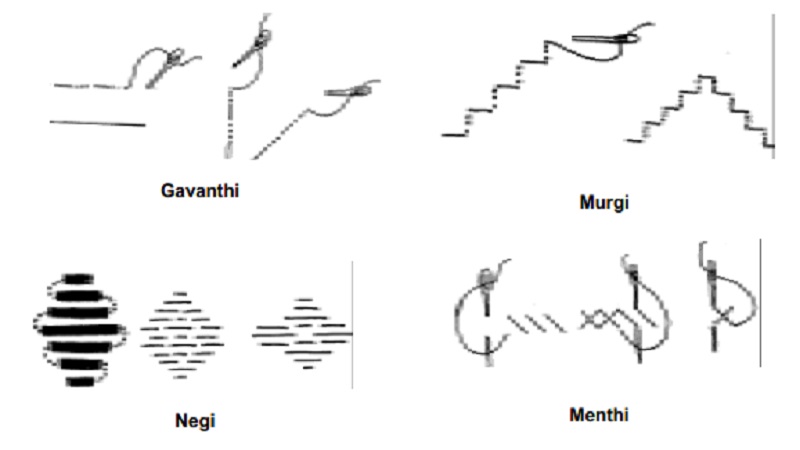Chapter: 11th 12th std standard Textiles And Dress Designing Cloth stitch Higher secondary school College practical steps methods Notes
Kasuti of Karnataka - History, Thread, Speciality, Types of stitches

Kasuti of Karnataka:
Kasuti is a world famous embroidery of Karnataka. 'Kai' means hand, and 'suti' means cotton thread. Hence Kasuti means hand work made of cotton thread.
History:
The women expressed their artistic urge by embroidering delicate piece of colourful art, the Kasuti. This art was passed from person to person and generation to generation. During leisure time the grandmothers used to teach Kasuti to their grandchildren, daughter-in-law and neighbours.
In oldern days it was a custom that the bride had to possess a black silk sari called 'chandra kali sari' with Kasuti work on it. As a matter of fact traditionally this embroidery is done on saris and blouses. The blouse (choli) on which Kasuti with match color motifs and borders worn with this sari is known as 'Khan'. The border of sari will be with Negi and Murgi stitches.
Thread:
Silk thread is used in olden days. Now instead of silk yarns, mercerised cotton threads with guaranteed color fastness are used. Two to four strands are used for fine and coarse work respectively. This may vary according to the type of material motif and stitch employed.
Motifs:
The motifs used in Kasuti are taken from mythological stories, architectural motifs like gopuras, shiva linga, nandi palanquine etc. are used. Apart from these various types of creepers, foliages, flowers, animals and birds are used.
Stitches:
Stitches are always worked in vertical, horizontal and diagonal manner. The common four types of stitches used in Kasuti are Gavanti, murgi, negi and menthi.
Speciality of Kasuti stitches:
The designs are never traced.
Embroidery starts without knitting threads, but with a tiny back stitch.
Types of stitches:
a. Gavanthi:
This is a simple more common stitch derived from the Kannada word-Gantu means 'knot'. It is a double running stitch, in which the first running stitch is filled by the second running stitch on the same line. The second one worked exactly opposite to the first one.
Gavanthi may be worked in horizontal, vertical or diagonal directions.
b. Murgi:
This is a zigzag runnings stitch which appears like staircase. It is same as Gavanti stitch but works in a stepwise manner. The work in both Gavanti and Murgi stitches is neat and tidy, where the design appears same on right and wrong side of the material. However, the stitches should be of uniform size. Designs are produced by grouping the tiny designs on regular intervals and sequences.
c. Negi:
d. Menthi:
Related Topics